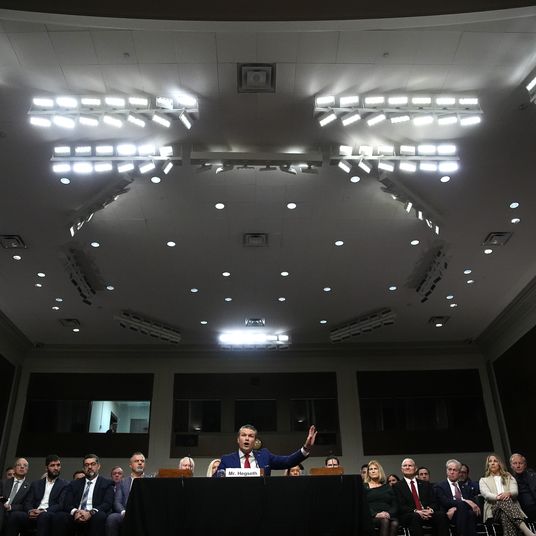
For the second consecutive week, highly secret files from a dead Republican’s redistricting consultant spilled into public view and caused heartburn for Republicans. Last week it was about evidence that the deceased gerrymandering wizard cooked up a phony excuse for the Trump administration’s nakedly partisan and arguably racist efforts to add a citizenship question to the 2020 census, affecting a case under consideration by the Supreme Court right now. Today there’s more from the New York Times’ Michael Wines, who broke the original story:
The late strategist, Thomas Hofeller, was the mastermind behind the G.O.P.’s gerrymandering strategy, and left behind four hard drives and 18 thumb drives containing more than 75,000 files that were found by his estranged daughter after his death in August.
The advocacy group Common Cause said in court documents submitted in Raleigh on Thursday that the Hofeller files include new evidence showing how North Carolina Republicans misled a federal court to prolong the life of their map of state legislative districts, which had been ruled unconstitutional.
Tar Heel Republicans got around demands for a re-redistricting by claiming they just didn’t have the time or the expertise to get the job done before the 2018 elections. Hofeller’s files showed that “almost all the work was already done: proposed new boundaries had been drawn for more than 97 percent of the state’s proposed Senate districts and 90 percent of House districts.” Thanks to the apparent lie, Republicans were able to keep a veto-proof legislative super-majority in place until 2020.
Lying to federal judges can get you into serious trouble.
In the census case, opponents of the citizenship questions, aware that SCOTUS appeared to be leaning strongly in favor of letting the administration have its way, had gone to a district court to ask for sanctions against Trump officials which, according to Hofeller’s files, were lying about their motives. The idea was to get the record used by SCOTUS changed before its expedited decision came down between now and the end of June. The judge sympathized but said it was too late to sort through the issue, authenticate the Hofeller files, and act. It’s unlikely this new trove of information from the files will have much if any impact on pending SCOTUS gerrymandering cases, since they turn less on legislative intent than on partisan consequences and the availability of remedies.
Still, this new information shows the extent to which today’s Republican Party is relying on stealth efforts to create and maintain legislative (and in the case of the presidency, Electoral College) majorities out of electoral minorities. And since Hofeller did work for his party all over the country, there could be a lot of evidence on this subject.
[T]he drives may contain maps, letters and other political documents that could offer more details on how the Republican Party cemented its dominance in state legislatures around the country.
No wonder Republican pols and operatives have been covering it all up, as Republican attorneys try to put the genie back in the bottle through threats to Common Cause.
[T]he day after documents from the Hofeller backups were filed in the census lawsuit in Manhattan, the lead lawyer for Common Cause in North Carolina, R. Stanton Jones of Arnold & Porter, received a blistering letter from a lawyer for Republican leaders of the North Carolina legislature.
The letter accused Mr. Jones, who also is involved in the census litigation, of “neglecting your professional responsibilities” in his handling of Mr. Hofeller’s storage drives, and asserted that all 75,000 files on them — which appear to contain hundreds of thousands of documents — were “highly confidential” and could not legally be made public.
This isn’t the behavior of people with nothing to hide. But it’s hard to come clean and admit you need to play dirty to win.






























